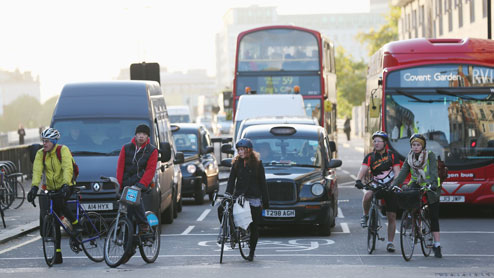Crossings
AS I drove my mother to our local hospital in London last month, my younger sister informed me from the back seat that she would have to take a special driving lesson organised by the government. What kind of test, my mother wondered, knowing that my sister had passed her driving test more than two decades ago and had been driving perfectly well all these years. My sister said: "Where I will be taught to drive slowly." My mother promptly retorted: "You don't need the government to teach you that, you can learn from Sajeda".
I have been the butt of many jokes in my family because I am considered the slowest driver of them all. If we had to reach somewhere in a hurry then I would not be the designated driver. I believe most rules have good reason behind them. My reply to family mocking has always been simple: "It is better to be safe than sorry". In the 30 years or so that I have been driving in the UK I have never been hauled up for any driving violation.

The speed limit in British towns and cities is 30 miles per hour (about 48 kilometres), and I would much rather drive at 29 mph than at 31. That is not to say that the rest of my family are rash drivers but an odd ticket for speeding is not unheard of. With the millions of speed cameras dotting British roads, it is very difficult to violate rules and get away with it. If you drive over the stipulated speed limit, a camera will go click and 14 days later a fine notice will come through your letter box and penalty points added to your licence. There are no humans involved who can be bribed to let you get away with the offence.
The minimum fine for speeding is a hundred pounds and three penalty points on your licence. If you build up 12 or more points over a period of three years, you will be banned from driving for six months to years, depending on the court's decision. Logging points on a licence are a dreaded thing because they adversely impact your pocket too - the more points you collect on your licence, the more is your vehicle and accident insurance payout.

Drinking and driving is a far worse crime and there is zero tolerance. If caught while even attempting to drive after drinking over the permissible amount of alcohol, there is an unlimited fine and six months in prison, and the same punishment exists if you refuse to be breathalysed. Causing a death by careless driving while under the influence means 14 years in jail - no excuses accepted! In a country where alcohol is a way of life, it is probably the strict punishments that have kept British roads relatively safe.
In comparison I feel frightened even as a pedestrian on Indian roads, thanks to the "I can get away with anything, including murder" attitude of some of the drivers. Every time I cross the road, I wonder if I will make it to other side in one piece. The sight of buses hurtling towards you as they race each other is enough give you a heart attack, if they haven't already run you over in their desperation to pick up passengers. Buses getting into accidents or knocking down pedestrians are considered freakish in the UK, maybe even an act of terrorism. Bus drivers are taught to drive very carefully and their tests even more stringent as they are responsible for the safety of all their passengers.
Fatalities are a regular occurrence on Indian roads and might is right. The bigger your vehicle the more you own the road and oppress those smaller than you. Breaking rules is our birth right. For years I tried to educate drivers who would wrap a seat belt round their arm, sometimes even their neck, at the sight of a policeman, that wearing seatbelts was for their own safety not the police's. But to no avail.
So at what speed was my sister driving to merit a special lesson? "I was doing 38 mph (61 kilometers) on a 30 mph road," she replied. That wouldn't even get a raised eyebrow in India.
Sajeda Momin











